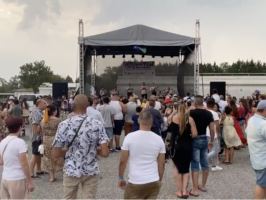The representative of national minorities in the Croatian Parliament, Veljko Kajtazi, commented live for N1 Studio on the latest statements of the President of Croatia, Zoran Milanović, who on Friday in Imotski commented on the Roma community and his earlier statements about them and the climate.
Veljko Kajtazi said that he did not ask for an apology from the president for his earlier statements, but added that he considered the statements inappropriate.
- NE TRAŽI ISPRIKU! ‘Ako on misli da ja nisam Rom koji je napisao prvi romski rječnik, koji govori romski jezik, neka mi kaže što sam!’ Ib: Dnevno. 29.07.2022. https://www.dnevno.hr/vijesti/ne-trazi-ispriku-ako-on-misli-da-ja-nisam-rom-koji-je-napisao-prvi-romski-rjecnik-koji-govori-romski-jezik-neka-mi-kaze-sto-sam-2001348/
